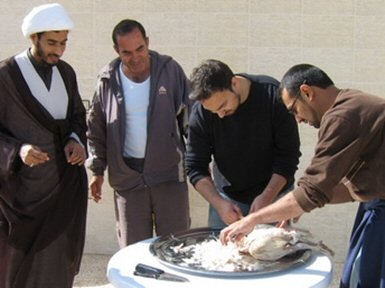Halal Meat
What is Halal Meat?
Halal Meat
Halal meat and other halal food items are becoming more common in the West, yet most Westerners remain oblivious or misinformed about their nature.
Halal means "permissible" in Arabic. Halal meat and other halal foods are those that have been certified to be permissible for Muslims to eat.
Can non-Muslims eat Halal meat?
Non-Muslims must not eat halal meat or other halal foods for three reasons. First, Muslim Brotherhood and other Muslim groups that certify meat and other items as being halal for a fee funnel some of those fees to Muslim "charities," including Hamas, Hezbollah and Holy Land Foundation that wage jihad; people who don't want to support Islamic terrorism should not buy meat or anything else bearing a halal label (see Islamophobia and Hitler & Islam).
Second, for meat to be officially certified as Halal:
• The animal to be slaughtered must not already be dead.
• The animal must not be a pig.
• The slaughterer must be a Muslim.
• The animal must be positioned to face Mecca.
• The slaughterer must place a blade on the throat of the animal.
• The slaughterer must proclaim, "Bismillah, Allahu Akbar!"
• The animal's throat must be sliced through, severing its carotid arteries and jugular
veins.
• All of the flowing blood must be allowed drain from the animal.
What is wrong with that?
"Bismillah" means "In the name of Allah," while "Allahu Akbar!" means "Allah is Greater!" Halal meat comes from animals that are sacrificed "in the name of Allah," who is declared "Greater" than the gods of all other religions. This is blasphemy to Christians who worship the true God, but it should also be offensive to Buddhist, Hindus and the adherents of other religions.
Third, Muhammad chose Allah, the moon god, from among the 360 pagan idol of ancient Mecca to be the sole god of Islam. The Bible clearly instructs Christian to refrain from eating meat that is identified as having been offered to an idol,* which is precisely what the halal label identifies.
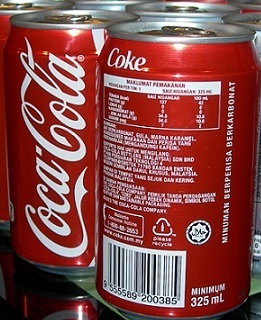 How
common is Halal food around the world?
How
common is Halal food around the world?
In Muslim and Muslim-majority nations, all meat is halal, all food is halal, and an increasing number of non-food items, including personal care products like skin lotion, are being labeled halal; everything to be purchased for human consumption and use is being dedicated to Allah, the moon god, with portions of the revenues funneled to Islamic terrorist groups. For example, in Malaysia, 60% of whose citizens are Muslim, even Coca Cola is dedicated to Allah (right).
Even in non-Muslim countries, the amount of halal food, including meat, being sold and consumed is surprisingly high. For example, halal meat now accounts for 70% of New Zealand's total lamb exports to the United Kingdom, while 100% of the meat slaughtered in Paris, France is already halal (see Sharia law in Europe and UK).
Why is so much halal meat and food being consumed in non-Muslim countries?
There are three reasons. First, most non-Muslims, including the majority of Christians, remain ignorant about halal. Even those who have heard about it have only a vague notion of it and think it is comparable to the Jewish kosher food. Some have even bought into the Muslims' Taqiyya and think it is high-quality "health" food.
Second, much of the halal food being sold in non-Muslim countries is actually not labeled halal, and this is with intent. Food producers and retailers view the growing Muslim populations in Western nations as lucrative growth markets. But supplying both halal and non-halal products requires operating two separate production lines, which would lower profit margins. Since the Muslim minority cares about halal but the non-Muslim majority doesn't yet care, the suppliers are choosing to operate just the halal production line and simply omit labeling as halal the products to be distributed in regions that are predominantly non-Muslim. Neither the New Zealand lamb export to the UK nor the meat slaughtered in Paris mentioned above were labeled halal until they were exposed.
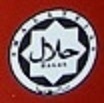 Third,
the halal label is typically very small, hard to
detect, and this is also as intended, as the producers and retailers want just the Muslim
customers to see them. If you missed the halal label near the bottom-right corner of the the Coca Cola can above, here it is, zoomed.
Third,
the halal label is typically very small, hard to
detect, and this is also as intended, as the producers and retailers want just the Muslim
customers to see them. If you missed the halal label near the bottom-right corner of the the Coca Cola can above, here it is, zoomed.
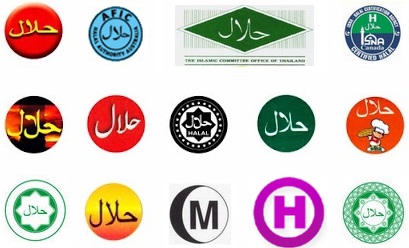 And
here are some of the other versions of the halal symbol found on food and other consumer products
from around the world. Notice that many of these symbols are only in Arabic,
incomprehensible to most people in the world. Even when the word "Halal" is displayed, it
is in small print that is not easy to see.
And
here are some of the other versions of the halal symbol found on food and other consumer products
from around the world. Notice that many of these symbols are only in Arabic,
incomprehensible to most people in the world. Even when the word "Halal" is displayed, it
is in small print that is not easy to see.
What can we do to stop having to eat halal meat and other halal food?
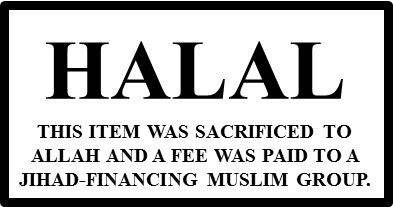 1.
Demand and pass laws requiring all halal products to be labeled in
a way that is truthful, easily recognizable and comprehensible to all shoppers (right).
1.
Demand and pass laws requiring all halal products to be labeled in
a way that is truthful, easily recognizable and comprehensible to all shoppers (right).
2. Take the time to check for halal labeling on all food and even non-food items you buy. When a halal label is detected, don't buy it, boycott both the retailer and the product supplier, and write to inform them of your boycott. Non-Muslims still comprise the majority of the world population. The world's food producers and retailers should be given a clear choice of making money from either the majority or the minority, but not from both while deceiving the majority.
3. Spread the word about halal.
* "Therefore I judge that we should not trouble those from among the Gentiles who are turning to God, but that we write to them to abstain from things polluted by idols, from sexual immorality, from things strangled, and from blood." (Acts 15:19-20)
* "If any of those who do not believe invites you to dinner, and you desire to go, eat whatever is set before you, asking no question for conscience’ sake. But if anyone says to you, 'This was offered to idols,' do not eat it for the sake of the one who told you, and for conscience’ sake; for 'the earth is the Lord’s, and all its fullness.'" (1 Corinthians 10:27-28)
